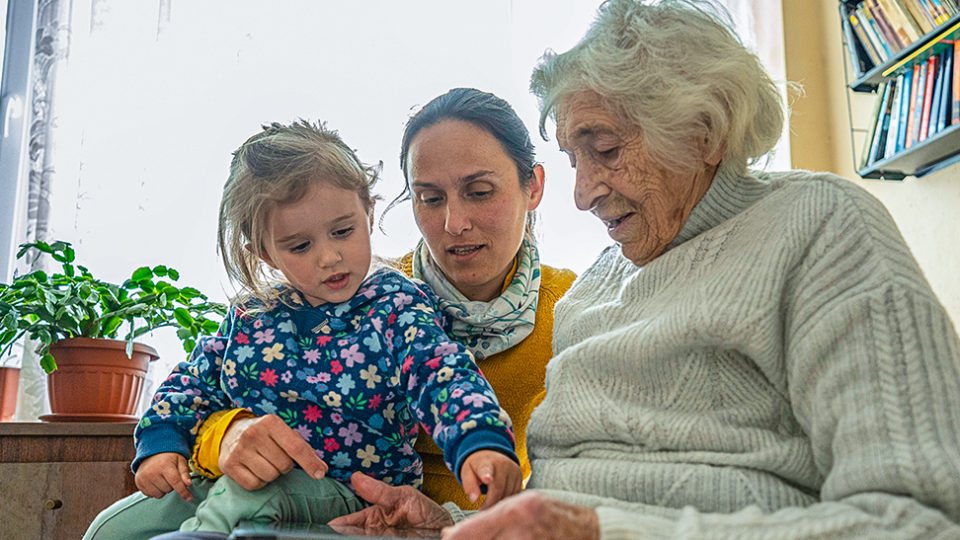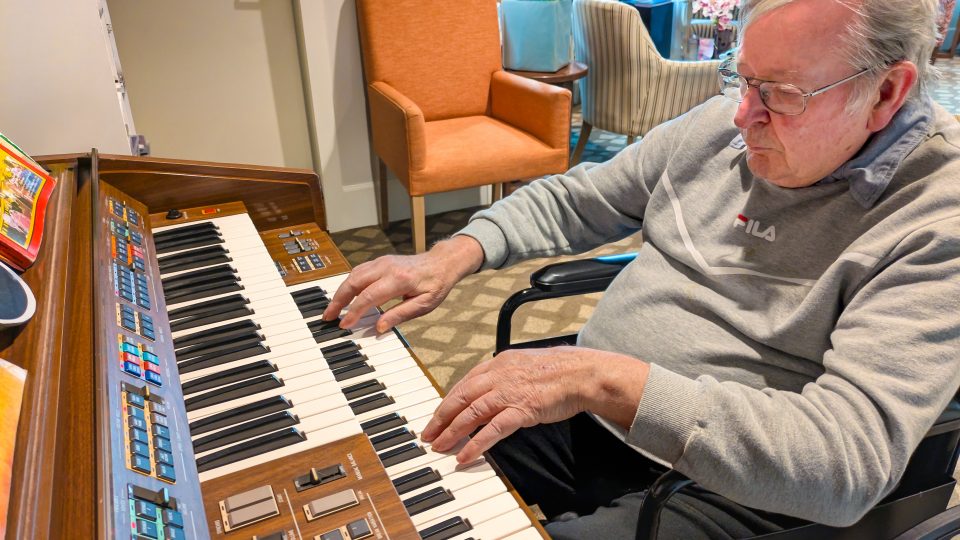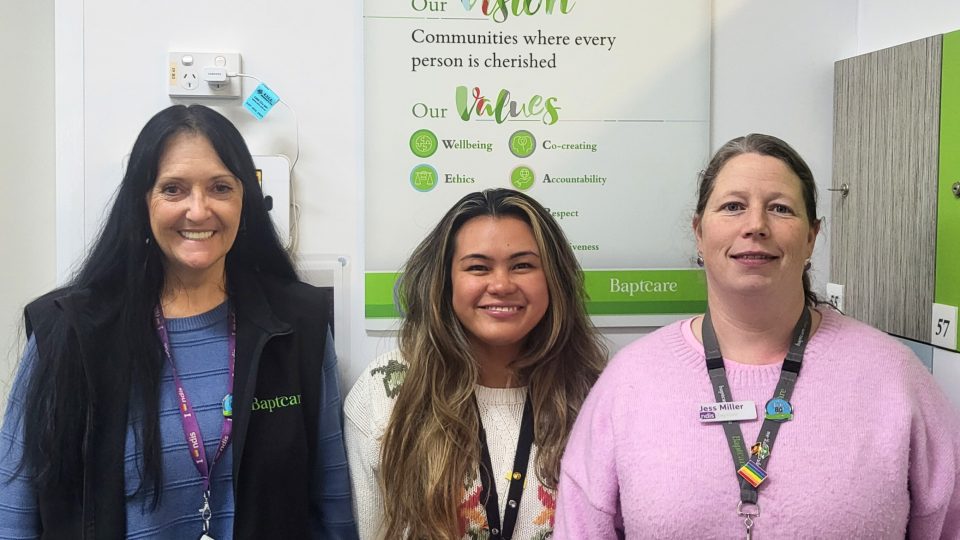Empowering families: insights from a Therapeutic Family Violence Practitioner
- 27 Nov 2024

Perhaps it’s no surprise that Clara* has forged a successful community service career supporting others. From an early age, she remembers keenly observing those around her, and having a curiosity about the different cultures she experienced as she moved from the UAE to India and then to Australia.
That special skill of being able to read the circumstances, feelings and motivations of others is no doubt, a valuable insight for someone working as a Therapeutic Family Violence Practitioner. Meeting with clients from different cultures and circumstances and being able to tap into their mindset is an important key to guiding someone on their path to recovery.
Read on to learn more about Clara’s work at Baptcare and how she finds balance while working in a challenging – but deeply rewarding – field.
The role of a Therapeutic Family Violence Practitioner
Baptcare’s WAVES (Wellbeing After Violence EndS) team – of which Clara is a part – delivers free therapeutic services for children, young people and adults recovering from their experience of family violence. Team members leverage a diverse skillset and work collaboratively in delivering tailored and culturally sensitive services, which are also LGBTQIA+ inclusive. Baptcare’s WAVES catchment area includes Brimbank, Melton, Hume-Merribek and Western Melbourne areas.
Clara’s job involves providing therapeutic services for family members in both individual and group settings. “We focus on a recovery framework and are heavily trauma focused,” she explains. “There’s a lot of psychotherapy involved as we work together with our clients to repair the dynamic they have with themselves and in their families as they recover from the violence they’ve experienced. It’s dynamic repair and renovation, occurring simultaneously.” Dyadic sessions, involving treating parents and children together across their interacting needs and within the framework of their culture, assists in bringing the family unit back into sync.
Clara usually meets with two clients a day, with services provided in the family home or in Baptcare’s office. Tuesdays are typically reserved for some team bonding, debriefing and internal meetings. “It’s an opportunity to share our experiences, including any interesting modalities we’ve discovered,” says Clara. “We come together and bond as a team, exchange insights and celebrate our highlights. Every time I share a case – anonymously, of course – I always feel celebrated and validated. Every single week,” she emphasises. “It’s a fabulous team to be a part of.”
Skills, training and support
With a degree in psychology, Clara has spent time studying and researching the way our brains work and how social connection is fundamental to wellbeing. “Working in community services is so rewarding and I’m delighted that we can deliver the +WAVES service at no cost to our clients,” she says. “It’s a really nice way to dedicate my time and knowledge.” Community events, such as a recent IndianCare function, provides Clara and the team an opportunity to network and collaborate with other professionals and organisations to better support their clients. “Indian Care focuses on Primary Prevention Work, establishing support for families with language diversity,” explains Clara. “Language barriers are one of the main preventers of support amongst victims of violence from Culturally and Linguistically Diverse communities.”
Working in the family violence space raises the question of how team members manage the emotional toll that comes with working in this field. “Being able to debrief with my colleagues really helps – but it’s also important to find balance and understand that I need to leave my work in the office when I go home,’ she says. “I have a lot of hobbies outside of work – ballet, martial arts and yoga – that help me feel grounded and allows me to change focus on to other things.”
A favourite book of Clara’s is ‘How to Talk So Kids Will Listen and Listen so Kids Will Talk’ by Adele Faber and Elaine Mazlish, which seeks to break the pattern of family arguments by exploring what assists in co-operation and communication. “It’s interesting because it looks at what makes people talk, feel and share something,’ she explains. “It dissects social cues and examines what our non-verbal cues are in resolving conflict. I think it makes us look at our inner child, too,” she says.
Asked who she would invite to a dinner party if she could invite anyone in the world, she nominates the conceptual and performance artist, Marina Abramovic. “I love how she riffs on life philosophies. I’d want to ask her: what was the theme you kept seeing in life? I ask a lot of people that,” she laughs. “I want to know – does it symbolise something? What is your life thesis? I’m such a huge fan of her work.”
Tips for someone wanting to work in the family violence field
When asked what advice Clara would give to someone keen on entering the family violence support field, she says, “remember the value of a system in supporting recovery. You need to support that system.” Clients are assisted through shared knowledge and cross functional teams, including systems of physical, spiritual and psychological care, which include GPs and case workers. “Active communication is key, along with ensuring frequency of meetings. Cohesion across the system is fundamental for our clients’ recovery,” she explains.
Clara remains hopeful and optimistic for the future as we grapple with the issue of family violence and work to support families emerging from trauma. “My favourite quote is It’s all possible and more,” she says. “That gave me a lot of hope growing up. Of course, you realise as you get older that we can’t do everything,” she chuckled with a wry smile. “Another quote I like is The obstacle is the way – from the Stoic philosopher, Marcus Aurelius. It’s all about the possibilities in life, and not getting bogged down in the problems,” says Clara.
No doubt you’ll agree – a wonderful philosophy to have in life – and a perfect attitude for someone working in the challenging field of family violence.
Thank you Clara, for everything you and the team at WAVES do to make a meaningful difference in our community.
If you would like to self-refer to Baptcare’s WAVES program, call us on 1800 570 784 during business hours, 9am-5pm, Monday to Friday or request a referral form by emailing pwreferrals@baptcare.org.au
If you are living in Australia and in immediate danger, call 000 for emergency support.
*Note that ‘Clara’ is a pseudonym used to protect the identity of our team member.
Community news
-

The sandwich generation phenomenon unpacked
Welcome to the first of two blogs on the theme of the sandwich generation in Australia. In this one, we’ll cover the definition of the sandwich generation, the different types of caring that fall within it and some of the issues those in the sandwich generation face. The second blog will cover tips for dealing with life in the sandwich generation
- 02 Jul 2025
-

Wyndham Lodge Choir
Every Tuesday afternoon, residents gather in the sunny music room at Baptcare’s Wyndham Lodge Residential Aged Care community to sing together.
- 25 Jun 2025
-

The Green Team at Moonah Hub
The Sustainability Team, known as ‘The Green Team’, are based at Baptcare Moonah Hub in Hobart and are all about promoting environmentally friendly and sustainable practices in their office, the wider organisation and the local community. We asked Jess Miller, their enthusiastic and determined leader, all about the team and what they do. Read more below!
- 11 Jun 2025
